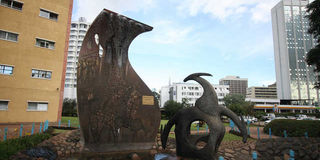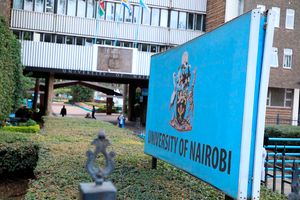
The fountain of knowledge at the University of Nairobi.
The University of Nairobi (UoN) has doubled its debt burden over the past two years, reaching Sh20 billion, raising concerns over its financial stability as well as its falling global academic ranking.
The rise in debt owed to various creditors has been attributed to declining government funding, high operational costs and poor financial management.
In an interview with the Daily Nation, the chancellor of the university Prof Patrick Verkooijen acknowledged that the university is grappling with a financial crisis.
He however said that UoN is undergoing sweeping reforms as part of a new transformation agenda aimed at addressing governance, financial instability, and academic decline.
“The house is on fire. Certain governance arrangements are not fit-for-purpose. Over the last two years, the University of Nairobi has doubled its debt to sh20billion and, for the first time in history, it has significantly fallen in global rankings, which impacts its reputation and competitiveness,” said Prof Verkooijen.
He warned that the decline could affect the university’s ability to attract partnerships and funding. Wrangles between the council of the university and its management have recently been in the limelight.
The revelation by Prof Verkooijen comes when the Committee PIC Education and Governance is scheduled to a meeting on February 12 2025 with leadership of UoN, among other institutions for consideration of the report of the Auditor General.
“We've dropped globally because our academic output is declining. To change that, we're making a concerted effort to create better incentives for both staff and students. More innovation, more research, and stronger performance will push us back up the ranks,” he said.
Prof Verkooijen said having a stable leadership and improved staff-student ratios would help in enhancing the institution’s academic performance.
He called for stability in leadership positions, noting that a large number of senior management staff are currently serving in acting capacities. This, he said, poses challenges for long-term institutional planning and decision-making.
“I don’t believe in an organisation where the majority of senior management services are acting. Acting functions are temporary, and in this reform agenda, appointing the vice-chancellor is the first priority. That’s critical to getting a CEO who is fit-for-purpose,” he said.
Once a substantive vice-chancellor is appointed, the focus will shift to filling other key leadership positions, including deputy vice-chancellors (DVCs) and deans, to ensure a solid and functional administrative structure. The position of VC has already been advertised by the Public Service Commission.
Prof Verkooijen revealed plans to commercialise idle university assets. This will begin with a forensic audit of ICT systems and procurement and aligning human resource policies with statutory requirements.
“We plan to revamp performance contracts to boost productivity and accountability. The University of Nairobi cannot expect a sudden increase in government funding—it won’t double, triple, or quadruple overnight. That’s just not realistic. Instead, the university must find new ways to sustain itself financially while staying relevant,” he said.
“To do that, we need reforms. But the big question is — where will the money come from? Someone has to cover the costs. One solution is to generate revenue from the university’s assets, particularly public land. However, this must be done transparently and with full accountability,” he added.
The chancellor announced the formation of a transparency board, marking a historic first for both the institution and the country. The board he said will play a crucial role in overseeing the university land and financial resources to ensure that monetisation of assets is conducted openly and responsibly.
"I want full clarity on how much land the university owns, its value, and how it will be used. This transparency board is being formed immediately and will include students, faculty, non-faculty staff, management, and myself as chancellor. Importantly, all information regarding the university’s assets will be published on the website, allowing the people of Kenya to monitor how their public resources are managed,” he said.
Further, the chancellor said the University plans to position itself as a leader in technological innovation to keep pace with the rapidly evolving global landscape. He noted that artificial intelligence (AI) is no longer a futuristic concept but a present-day driver of economic transformation, reshaping industries and redefining job markets.
UoN is working towards integrating AI into its existing disciplines, ensuring that students across various faculties — from engineering and medicine to business and law — gain a foundation in artificial intelligence.
“AI is no longer just for computer scientists. Whether you are a doctor, an economist, a lawyer, or even a journalist, AI will shape your field. Our goal is to equip every student at the University of Nairobi with AI knowledge and skills that will be relevant in their careers,” the Chancellor said.
“We are engaging top players in the AI ecosystem to ensure our students and faculty have access to the latest research, funding opportunities, and mentorship from global experts,” he said.






